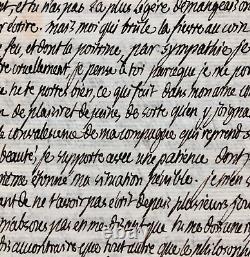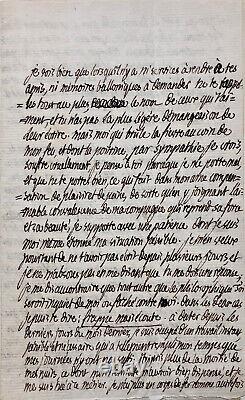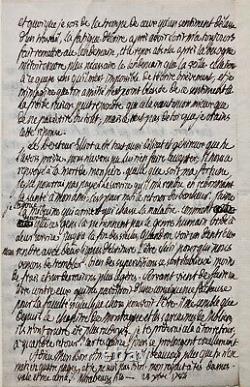
- Homepage
- Author
- Alfred Bruneau (3)
- Beydts (louis) (4)
- Camille Mauclair (3)
- Charles De Gaulle (3)
- Charles Monselet (3)
- Chateaubriand (5)
- Colette (3)
- Ernest Daudet (3)
- Eugène Labiche (3)
- Jean Couty (3)
- Jean-léon Gérôme (5)
- Louise Read (4)
- Marcel Proust (5)
- Paul Chabas (4)
- Paul Meurice (3)
- Proust (3)
- Roger Martin Du Gard (4)
- Salomon Reinach (3)
- Sully Prudhomme (7)
- Violette Leduc (4)
- Other (4028)
- Binding
- Era
- 18th Century (11)
- 1900 To 1960 (63)
- 1930s (4)
- 1960s (5)
- 1970s (7)
- 19th (5)
- 19th Century (48)
- 20th Century (15)
- Beautiful Era (12)
- Belle Epoque (49)
- First Empire (9)
- Nineteenth (19)
- Nineteenth Century (11)
- Post-war (23)
- Restoration (17)
- Revolution (4)
- Roaring Twenties (28)
- Second Empire (21)
- Second World War (6)
- World War Ii (9)
- Other (3737)
- Language
- Region
- Subject
MIRABEAU Autographed Letter Signed, from his exile in London (1784)





MIRABEAU Honoré Gabriel Riqueti, Count of. 1749 - 1791 - Writer, diplomat and politician, nicknamed "The People's Speaker." Signed autograph letter addressed to a close relative - [London], December 28, 1784 - 2 pp. On a double in-8 sheet.
In a different hand on the second sheet: "Mirabeau, London, Dec 28. Letter from his London exile addressing medical issues.
In August 1784, he went into exile in London, accompanied by Henriette de Haren, Lucas de Montigny, his natural son, and Jacques-Philippe Hardy, his secretary whom he would dismiss during his stay. "I see clearly that when there are no services to render to your friends, nor balloonic memories." [probably in reference to balloons, which were being experimented with for the first time]. When you ask, you remember at most the name of those who love you, and you don't feel the slightest itch to write to them. But as I burn with fever by my fire and my chest, I believe, suffers cruelly by sympathy, I think of you because I am unwell, and you are well, which in my soul brings a balance of pleasure and pain, so that by adding the delightful recovery of my company regaining its strength and beauty, I endure with a patience that even surprises myself my difficult situation.
Yet I blame myself for not having written to you for several days and I do not absolve myself by saying that you owe me a response. On the contrary, I tell myself that anyone other than the philosophical you would be worried about me or angry with me.
In both cases, I can say to you: strike but listen. Plutarch, the fury of battles should not drown out the voice of reason. Starting from the last days of last month, I have been busy with a work, a painful and necessary task that has so filled my time that my days have not been enough; I took more than half of my nights, which my Henriette would have spared me, and I killed myself with this work. I no longer have a body of iron as before and although I am one of those whose feelings relieve them from work, the fatigue of writing after writing has always made me put it off until tomorrow, and absolute rest after the task was even more necessary the next day than the day before.This is because I feel that it is impossible for me to write briefly to you and I imagine that your friendship is not wounded by this feeling. Cold reason can respond that this is still better than not writing at all; but it is not from you that I fear this response.
Has been just as delicate and generous as you had anticipated. We could not make him accept anything; he sent us back to the death of my father, whatever my fortune, I will not be able to repay the service he rendered me by restoring my friend's health; it is for me the return of happiness.
I assure you, I love medicine that fights and drives away disease. How can these people not hold the human race bound to their service until the end of time.
When one of them sees us, with just two lines of writing, give back the beloved being for whom we have just trembled. Many superstitions have been established at less cost and on lighter reasons. Servant has just written a book against them, which seems to me to be a unfortunate consequence for the profession if anything were to be thought of. It seems to me that since Montaigne's chapter and Molière's sarcasms, they have hardly been more severely criticized.I will lend you that upon your return. When will this return be? For your fifteen days are cruelly prolonged. Farewell my good friend, because here is much more than you put in four pages and I am not well. On September 20, 1784, the.
Considerations on the Order of Cincinnatus were published. A polemical work, to which Chamfort had contributed, and whose printing had been accelerated by Benjamin Franklin cf.
Letter of recommendation dated September 7 addressed by Franklin to Benjamin Vaughan. Mirabeau is also working on. Doubts about the Freedom of the Scheldt. A work related to the issue of borders between Holland and the Austrian Netherlands. Lawyer Antoine Servant had just published his. Doubts of a provincial proposed to the physician-commissioners appointed by the king to examine animal magnetism. Following a healing attributed to magnetism, he had become a fervent defender of mesmerism and in this work he challenged the Royal Society of Medicine. Small split at the vertical fold, see photos.
